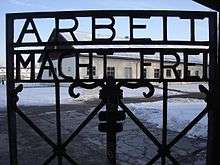
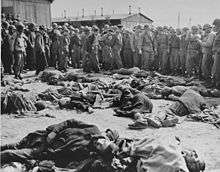
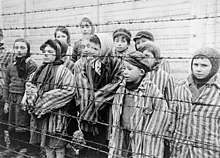
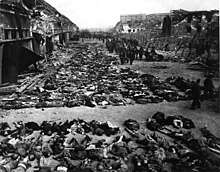
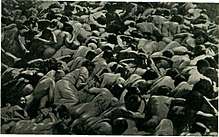
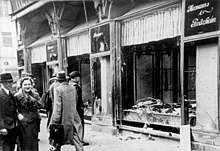
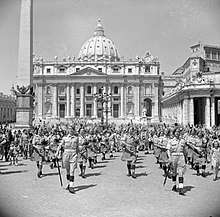
- REDIRECT
Jews, Slavs, communists, homosexuals, the mentally and physically disabled and members of other political and religious groups were targeted and methodically murdered in the largest genocide of the 20th century.
Quotes
- Alphabetized by author
A
- During the nation building stage, the Shoah served as a heuristic device to prove the absolute validity of the Zionist prognosis that Israel was the only solution to the "Jewish problem." The lives and memories of the "ordinary" (i.e. non-heroic) victims and survivors were largely disclaimed as an ideological liability; no space was made available in the public sphere to accommodate their tragic ordeals.
- Guile Neeman Arad, "Israel and the Shoah: A Rale o Multifarious Tabos Taboo trauma Holocaust", Spc issue of New German Critique, 90 (Autumn 2003): 5-26; qtd. in "From Terrorist to Tzadik: Reading Comic Books as Post-Shoah Literature in Light of Magneto's Jewish Backstory", by Nicholaus Pumphrey in Ages of the X-Men: Essays on the Children of the Atom in Changing Times, ed. Joseph J. Darowski, p. 94.
- In 1963 the ministry of education advised to increase to six the number of hours allocated to the history of the Shoah, placing renewed emphasis on its heroic version as exemplified by the ghetto fighters....The first harbingers of this mind-set came into view in 1967, during the three-week "waiting period" before the Six-Day War, when the Shoah was summoned to validate demands for "war now" and for a "strong man" to lead the nation to victory.
- Ibid, p. 96
B
- The bureaucratic culture which prompts us to view society as an object of administration, as a collection of so many 'problems' to be solved, as 'nature' to be 'controlled', 'mastered' and 'improved' or 'remade', as a legitimate target for 'social engineering', and in general a garden to be designed and kept in the planned shape by force (the gardening posture divides vegetation into 'cultured plants' to be taken care of, and weeds to be exterminated), was the very atmosphere in which the idea of the Holocaust could be conceived, slowly yet consistently developed, and brought to its conclusion.
- Zygmunt Bauman, Modernity and the Holocaust (1989)
- I totally regret as a German what happened at this point of history. But when people ask me are you, as a German, feel responsible for the Holocaust? No, because I'm born 1965 and it would be completely un-logical to say I'm responsible, but as a country we are responsible.
C
- Complain, complain, that's all you've done ever since we lost,
If it's not the crucifixion then it's the holocaust.- Leonard Cohen, in "The Captain" Various Positions (1984).
- If the Catholic Church hadn't so consistently and virulently condemned the Jews for killing Jesus, there would have been no Holocaust. There would have been no reason for anyone to think about picking on Jews. And that means today there might be no Jewish state, and no Middle East conflict. That's quite a lot to have on your conscience, isn't it? How fortunate for the Catholic Church that it doesn't possess a conscience, but at least it gives ordinary Catholics an opportunity to feel guilty about something real for a change, if they feel so inclined, and to reflect on the reality that the Jews didn't kill Jesus at all. The Catholic Church killed Jesus, and has spent the last two thousand years dragging his entrails through the dirt. And if he came back tomorrow, he'd be the first to say so. You know it's true. We all do.
- Pat Condell, Is Satan a Catholic? (March 27, 2010; from YouTube).
- Jews abused and attacked on the streets... Mobs attacking synagogues... Nobody gives a damn about Jews and they never have, which is why the Holocaust was allowed to happen in the first place.
- Pat Condell, "A New Kind of Hate" (27 January 2015), YouTube.
- They will never forgive us for the evil they've done us.
- Welcome in Vienna (1986), written by Axel Corti & Georg Stefan Troller, according to Marceline Loridan-Ivens,But You Did Not Come Back, p. 98.
E
- The things I saw beggar description... The visual evidence and the verbal testimony of starvation, cruelty and bestiality were . . . overpowering. . . . I made the visit deliberately, in order to be in [a] position to give first-hand evidence of these things if ever, in the future, there develops a tendency to charge these allegations merely to “propaganda.”
- Negationism means the denial of historical crimes against humanity. It is not a reinterpretation of known facts, but the denial of known facts. The term negationism has gained currency as the name of a movement to deny a specific crime against humanity, the Nazi genocide on the Jews in 1941–45, also known as the holocaust (Greek: complete burning) or the Shoah (Hebrew: disaster). Negationism is mostly identified with the effort at re-writing history in such a way that the fact of the Holocaust is omitted.
- Koenraad Elst. Chapter One – Negationism in General, Negationism in India: Concealing the Record of Islam, 2002. Also in
F
- ... in spite of everything, I still believe that people are really good at heart. I simply can’t build up my hopes on a foundation consisting of confusion, misery, and death. I see the world gradually being turned into a wilderness, I hear the ever approaching thunder, which will destroy us too, I can feel the sufferings of millions and yet, if I look up into the heavens, I think that it will all come right, that this cruelty too will end, and that peace and tranquility will return again.
- As for the Jews, well, I can tell you quite frankly that one way or another we have to put an end to them... In January, there is going to be an important meeting in Berlin to discuss this question...Whatever its outcome, a great Jewish emigration will commence. But what is going to happen to these Jews? Do you imagine there will be settlement villages for them in the Ostland? In Berlin we were told: Why are you making all this trouble for us? There is nothing we can do with them here in the Ostland or in the Reich Commissariat. Liquidate them yourselves!
- Hans Frank, the Nazi Governor-General of the General Government, December 16, 1941, Gerlach, Christian (December 1998). "The Wannsee Conference, the Fate of German Jews, and Hitler's Decision in Principle to Exterminate All European Jews". The Journal of Modern History 70 (4): 790. doi:10.1086/235167. Reprinted in Bartov, Omer, ed. (2000). The Holocaust: Origins, Implementation, Aftermath. London: Routledge. pp. 106–140. ISBN 0-415-15035-3.
G
- Hitler killed five million [sic] Jews. It is the greatest crime of our time. But the Jews should have offered themselves to the butcher's knife. They should have thrown themselves into the sea from cliffs.....It would have aroused the world and the people of Germany.... As it is they succumbed anyway in their millions.
- Mahatma Gandhi, June 1946, in an interview with Louis Fischer. Rabbi Stephen Pearce, Torah Offers Ethics, rules, so all is fair in love and war, September 2000, . Quoted from Hinduism and Judaism compilation The Life of Mahatma Gandhi (1950) by Louis Fischer. The quote is in the context of Gandhi's argument to his biographer that collective suicide would have been a heroic response that would have "aroused the world and the people of Germany to Hitler's violence".
- If all Hitler had done was kill people in vast numbers more efficiently than anyone else ever did, the debate over his lasting importance might end there. But Hitler's impact went beyond his willingness to kill without mercy. He did something civilization had not seen before. Genghis Khan operated in the context of the nomadic steppe, where pillaging villages was the norm. Hitler came out of the most civilized society on Earth, the land of Beethoven and Goethe and Schiller. He set out to kill people not for what they did but for who they were. Even Mao and Stalin were killing their "class enemies". Hitler killed a million Jewish babies just for existing.
- Nancy Gibbs, as quoted in TIME magazine (3 January 2000).
- In a 1940 New Year message Gauleiter Arthur Greiser said that the only use to be made of the Poles was as slaves for Germany, but for the Jews there was no future.
- The Daily Telegraph 25.06.1942 about Arthur Greiser (1897-1946, Nazi German politician in occupied Poland, SS-man, war criminal, he was punished with death). Gauleiter was the party leader of a regional branch of the Nazi Party.
H
- The discourse in the Muslim world about Jews is utterly shocking. Not only is there Holocaust denial—there’s Holocaust denial that then asserts that we will do it for real if given the chance. The only thing more obnoxious than denying the Holocaust is to say that it should have happened; it didn’t happen, but if we get the chance, we will accomplish it. There are children’s shows in the Palestinian territories and elsewhere that teach five-year-olds about the glories of martyrdom and about the necessity of killing Jews.
- Sam Harris, "Why Don't I Criticize Israel?" (27 July 2014), Sam Harris.
I
- The catastrophe which recently befell the Jewish people - the massacre of millions of Jews in Europe - was another clear demonstration of the urgency of solving the problem of its homelessness by re-establishing in Eretz-Israel the Jewish State, which would open the gates of the homeland wide to every Jew and confer upon the Jewish people the status of a fully privileged member of the comity of nations. Survivors of the Nazi holocaust in Europe, as well as Jews from other parts of the world, continued to migrate to Eretz-Israel, undaunted by difficulties, restrictions and dangers, and never ceased to assert their right to a life of dignity, freedom and honest toil in their national homeland.
K
- With about 350,000 Holocaust survivors living in Israel at the time and when including also their children and their immediate families, a rough estimate of those directly or indirectly affected by the Holocaust would be approximately one million people. Though only a small percentage of these were assumed to be more vulnerable to mental distress, the population at risk still constituted a large number of individuals who were in need of special mental health services hitherto not provided.
- Natan P.F. Kellermann, ‘’The Long-term Psychological Effects and Treatment of Holocaust Trauma’’, p. 2.
- The following ten characteristics are frequently observed in Holocaust survivors who apply for psychiatric treatment at AMCHA: (1) Massive repression, numbing of responsiveness, amnesia, alexithymia; (2) Intrusive memories, Holocaust-related associations, “shattered assumptions”; (3) Anhedonia, suicidal ideation, depression, chronic state of mourning; (4) Survivor guilt; (5) Sleep disturbances and nightmares; (6) Problems with anger regulation and in dealing with interpersonal conflicts; (7) Excessive worries, anxieties, catastrophic expectancy, fear of renewed persecution; (8) Suspiciousness, paranoia, isolation from the community, lack of trust, loneliness; (9) Utilization of survival strategies “from there”; and (10) Low threshold for stress in difficult situations.
- Ibid, p. 3-4.
- Most commonly, Holocaust survivors respond with habitual panic when exposed to triggers that in some way symbolize the Holocaust. Such Holocaust associated triggers may include any or all of the following: crowded trains, train stations, medical exams, a knock at the door, uniforms, extermination (of insects), yellow color, selections, gas, shower, barbed wire, discarding food (especially bread), fences, cruelty, barking dogs, any major disaster or discrimination, separations, the smell of burned flesh, closed spaces, an oven, standing in line, the freezing cold, music by Wagner, the German language and German products in general. Any of these stimuli may create a violent emotional response in the survivor who at that moment is thrown back to a life-threatening situation during the Holocaust. In addition, happy occasions such as weddings, Jewish holidays and family celebrations may also evoke sudden grief reactions, as they remind survivors of their immense loss and all the people who are absent because they were so brutally killed. As a consequence, there is frequently a contradictory effort both to remember and to forget, both to approach and to avoid the traumatic event in a compulsively repeated fashion. Like a broken record that is spinning around and around, intrusive experienced images and painful memories keep coming back while at the same time there is a conscious effort to avoid them and not to think about them.
- Ibid, p. 4.
- The road to Auschwitz was built by hate, but paved with indifference.
- Ian Kershaw, as quoted in Popular Opinion and Political Dissent in the Third Reich: Bavaria 1933-45 (1983), by I. Kershaw, p. 277.
- I have concluded that one way to pay tribute to those we loved who struggled, resisted and died is to hold on to their vision and their fierce outrage at the destruction of the ordinary life of their people. It is this outrage we need to keep alive in our daily life and apply it to all situations, whether they involve Jews or non-Jews. It is this outrage we must use to fuel our actions and vision whenever we see any signs of the disruptions of common life: the hysteria of a mother grieving for the teenager who has been shot; a family stunned in front of a vandalized or demolished home; a family separated, displaced; arbitrary and unjust laws that demand the closing or opening of shops and schools; humiliation of a people whose culture is alien and deemed inferior; a people left homeless without citizenship; a people living under military rule. Because of our experience, we recognize these evils as obstacles to peace. At those moments of recognition, we remember the past, feel the outrage that inspired the Jews of the Warsaw Ghetto and allow it to guide us in present struggles.
L
- The Holocaust pictures that I saw, as one who grew up here, were of naked women. We were in elementary school. I remember how embarrassed we were.
- Ari Libsker qtd. by Isabel Kershnersept, "Israel’s Unexpected Spinoff From a Holocaust Trial", The New York Times, (Sept 6, 2007).
- In the early 1990s, when serving as a consultant to the team planning the United States Holocaust Memorial Museum, I attended a meeting of the Content Committee, the group of laypeople who reviewed the plans for the museum's permanent exhibition. It promised to be a spirited gathering. At issue was the question of displaying hair that the Germans had "harvested" from Jewish women at Auschwitz and sold to factories that produced blankets and water-absorbent socks for U-boat crews. When the Soviets liberated the camps, they found storehouses filled with hair. The Auschwitz Museum had given the USHMM a number of kilos of it. The museum designers planned to display it near a pile of victims' shoes, which also came from the camps. When the plan was first proposed, some staff members objected, arguing that it degraded and objectified the women. Although it was appropriate to display hair at Auschwitz, they did not think it should be displayed a continent away from there. Some feared that teenagers would find it, given the particular world that this age cohort often inhabits, ghoulishly amusing. Their opposition notwithstanding, the committee voted nine to four to display it. Then a number of survivors grew wary and asked that the matter be reconsidered; hence this meeting. The project director had come equipped with scholarly, psychological, and even rabbinic arguments to counter the opponents. Scholars, including one of the most eminent Holocaust historians—committee member Raul Hilberg—argued that the hair should be displayed because it demonstrated the Final Solution's "ultimate rationality." The Germans considered a body part something to be transformed into an "industrial object" and a salable commodity. Psychologists believed that the display of the hair would be no more disconcerting than many other aspects of the exhibit. Leading Orthodox rabbis determined that displaying it did not constitute a nivul hamet, desecration of the dead, and transgressed no religious rulings. In an attempt to allay some of the objections, the designers proposed that a wall be built in front of the exhibit case. Visitors would have to choose to see the display and not just happen upon it.
- Deborah Lipstadt, The Eichmann Trial, (2011); excerpted in "The Eichmann Trial: Fifty Years Later", All Things Considered, NPR, (March 27, 2011).
- I'd become as hard-hearted as the deportees who saw us arrive at Birkenau without saying a single comforting word. Surviving makes other people's tears unbearable. You might drown in them.
- w:Marceline Loridan-Ivens, But You Did Not Come Back (trans. Sandra Smith, 2015,6), p. 25.
M
- We can only shape a bright future if we are aware of Germany's enduring responsibility for the ultimate betrayal of all civilised values that was the Holocaust.
- Angela Merkel's (political leader of Germany) speech about the Holocaust (Shoah).
- Source:United States Holocaust Memorial Museum 24.04.2017
Auschwitz existed within history, not outside of it. The main lesson I learned there is simple: We Jews should never, ever become like our tormentors …
Since 1967 it has become obvious that political Zionism has one monolithic aim: Maximum land in Palestine with a minimum of Palestinians on it. This aim is pursued with an inexcusable cruelty as demonstrated during the assault on Gaza. The cruelty is explicitly formulated in the Dahiye doctrine of the military and morally supported by the Holocaust religion.
I am pained by the parallels I observe between my experiences in Germany prior to 1939 and those suffered by Palestinians today. I cannot help but hear echoes of the Nazi mythos of "blood and soil" in the rhetoric of settler fundamentalism which claims a sacred right to all the lands of biblical Judea and Samaria. The various forms of collective punishment visited upon the Palestinian people -- coerced ghettoization behind a "security wall"; the bulldozing of homes and destruction of fields; the bombing of schools, mosques, and government buildings; an economic blockade that deprives people of the water, food, medicine, education and the basic necessities for dignified survival -- force me to recall the deprivations and humiliations that I experienced in my youth. This century-long process of oppression means unimaginable suffering for Palestinians.
- Hajo Meyer, "An Ethical Tradition Betrayed," huffingtonpost.com, Jan. 27, 2010. Retrieved on March 27, 2010.
N
- I wish I could promise you... that the lessons of history have been learned. I can only urge the leaders of the world not to repeat the mistakes of the past. Not to sacrifice the future for the present; not to ignore aggression in the hopes of gaining an illusory peace. But I can guarantee you this, the days when the Jewish people remained passive in the face of genocidal enemies, those days are over! We are no longer scattered among the nations, powerless to defend ourselves. We restored our sovereignty in our ancient home. And the soldiers who defend our home have boundless courage. For the first time in 100 generations, we, the Jewish people, can defend ourselves. This is why; this is why, as a prime minister of Israel, I can promise you one more thing: Even if Israel has to stand alone, Israel will stand. But I know that Israel does not stand alone. I know that America stands with Israel. know that you stand with Israel. You stand with Israel, because you know that the story of Israel is not only the story of the Jewish people but of the human spirit that refuses again and again to succumb to history's horrors. Facing me right up there in the gallery, overlooking all of us in this august chamber is the image of Moses. Moses led our people from slavery to the gates of the Promised Land. And before the people of Israel entered the land of Israel, Moses gave us a message that has steeled our resolve for thousands of years.
- Benjamin Netanyahu, address to a joint meeting of the United States Congress (3 March 2015), Washington, D.C.
O
- I think many non-Jews don't realise the tremendous emotional heat that is involved here in the second half of the twentieth century. A heat that derives from the Holocaust. That is to say the destruction, the mass murder of the Jews in Eastern Europe where most of the Jews were. That both the Israelis and the Jews of the United States are the bereaved children of that population who were murdered. And the bond between the Jews of the United States and the people of Israel has the emotional intensity derived from that common bereavement. And that is what gives. I do understand that people resent the power of the pro-Israel lobby in this country [the US], but that power derives from that elemental basic bond of the common bereavement and the horror that is there in the background. Therefore, Jews in the United States do react strongly – and that's what makes this a very powerful lobby, and it is – they do react strongly to anything that seems to them to threaten the connection of the United States in Israel, which is Israel's lifeline. They see this as threatening. This may be an exaggerated fear, but always there is the shadow there of a possible new Holocaust. Israel overrun. The people of Israel massacred again.
- Conor Cruise O'Brien, on C-SPAN (26 March 1986).
R
- Every movement that seeks to enslave a country, every dictatorship or potential dictatorship, needs some minority group as a scapegoat which it can blame for the nation's troubles and use as a justification of its own demands for dictatorial powers. In Soviet Russia, the scapegoat was the bourgeoisie; in Nazi Germany, it was the Jewish people.
- Ayn Rand, as quoted in Capitalism: The Unknown Ideal (1966).
- Saidel, Hedgepeth and others who share their passion know they face obstacles in bringing attention to sexual assaults during the Holocaust.
They say some people believe that focusing on gender-specific experiences takes away from the overall human and Jewish experience. Others have suggested that sexual violence against Jews wasn't a real issue because racial purity laws prohibited intercourse between Germans and Jews. And then there are those, they say, who are uncomfortable accepting testimonies as proof of occurrences.
But Saidel wants to know this: If historians are willing to look at how the Holocaust experience differed from country to country and camp to camp, why shouldn't they also examine how experiences differed between men and women?
As for the argument that racial purity laws protected Jewish women, she says, "That's absurd. That's like saying there are laws against rape so people don't get raped."- Jessica Ravitz in "Silence lifted: The untold stories of rape during the Holocaust", CNN, (June 24, 2011).
W
- How is one to speak of such things and not lose one’s mind, and not beat one’s fists against the wall? It is as impossible to speak of them as not to speak of them. Too many corpses loom on our horizon; they weigh on every one of our words, their empty eyes hold us in check. One would have to invent a new vocabulary, a new language to say what no human being has ever said.
- Elie Wiesel , ‘’A Jew Today’’. New York: Random House, (1978) , p. 236; as qtd. in Natan P.F. Kellermann, ‘’The Long-term Psychological Effects and Treatment of Holocaust Trauma’’, p. 5.
- Close your eyes and listen. Listen to the silent screams of terrified mothers, the prayers of anguished old men and women. Listen to the tears of children. Jewish children, a beautiful little girl among them, with golden hair, whose vulnerable tenderness has never left me. Look and listen as they walk towards dark flames so gigantic that the planet itself seemed in danger.
- Elie Wiesel, From an address given at Auschwitz in occasion of the fiftieth anniversary of the Holocaust, Jan. 1995.
- What is abnormal is that I am normal. That I survived the Holocaust and went on to love beautiful girls, to talk, to write, to have toast and tea and live my life — that is what is abnormal.
- Elie Wiesel, After being asked "What does it take to be normal again, after having your humanity stripped away by the Nazis?" in an interview in O : The Oprah Magazine Nov. 2000.
- The duty of the survivor is to bear testimony to what happened... You have to warn people that these things can happen, that evil can be unleashed. Race hatred, violence, idolatries—they still flourish.
- Elie Wiesel, The Watchtower, June 15, 1995; Will Hatred Ever End?
Y
- At the time of the Eichmann trial, the Holocaust survivors made up approximately one quarter of the population of Israel and were viewed as immigrants who had arrived in the country at the time of its establishment. The Holocaust was referred as a tragic, brutal chapter in the history of European Jewry. But the eye witness accounts heard in the Jerusalem courtroom, transformed the public perception of the survivor community.
- Yablonka, Hanna and Moshe Tlamim; "The Development of Holocaust Consciousness in Israel: The Nuremberg, Kapos, Kastner and Eichmann Trials", in "Israel and the Holocaust", Spec. issue of Israel Studies 8.3 (Fall, 2003): 1-23; as quoted in "From Terrorist to Tzadik: Reading Comic Books as Post-Shoah Literature in Light of Magneto's Jewish Backstory", by Nicholaus Pumphrey in Ages of the X-Men: Essays on the Children of the Atom in Changing Times, ed. Joseph J. Darowski, p. 104.
Unknown
- "The Germans will never forgive the Jews for Auschwitz."
- Unknown, misattributed to Zvi Rex.